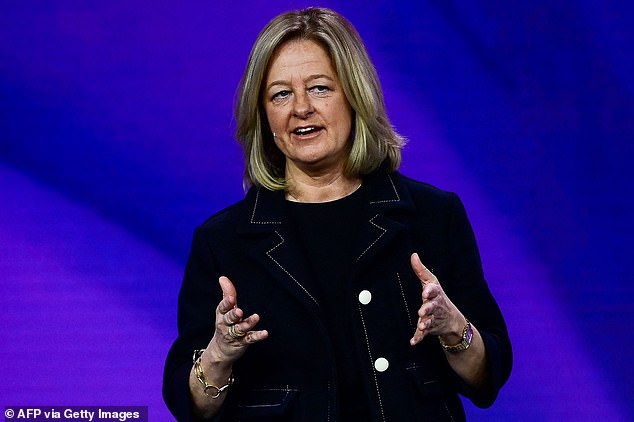Table of Contents
BT shares are back in the spotlight after another foreign billionaire took a stake in the group.
Indian tycoon Sunil Bharti Mittal is the latest tycoon to buy a stake in the telecoms group, becoming its largest shareholder through his investment firm Bharti Enterprises.
The move comes just months after Mexican billionaire Carlos Slim acquired his own 3.2 percent stake in the former state monopoly.
So is the backing of two of the world’s richest men a sign that BT shares are a good investment, or one to steer clear of?
Turnaround: BT chief executive Allison Kirkby has overseen a surge in shares since taking over the telecoms giant in February
French investor Patrick Drahi clearly believes now is the time to sell, three years after buying BT shares, and he is doing so at a loss of close to £1bn.
But his decision to sell his 24.5 per cent stake in BT comes at a time when his debt-ridden Altice group is facing its own problems.
And with BT shares up 26 percent since Allison Kirkby took over as chief executive in February, 15 analysts rate the stock a “buy,” according to Reuters data.
Susannah Streeter, director of money and markets at Hargreaves Lansdown, said Mittal’s addition was “a confidence-boosting move” and showed there was “untapped long-term value in the group”.
Karen Egan, senior telecoms analyst at Enders Analysis, added that Mittal’s backing is “a strong validation of the company’s outlook and strategy.”
He said Mittal, 66, was also “a completely different person to Patrick Drahi” and was likely to be “fully constructive and collaborative with BT”.
Only two City analysts have advised shareholders to sell their stakes in BT and three rate the stock as “hold” for those who already own it.
This will probably be music to the ears of BT’s army of 614,000 individual investors, many of whom have backed BT since it was privatised in 1984.
While shares have risen since Kirkby’s arrival, they remain nearly 90 percent below their peak in late 1999, before the dot-com crash.
They are still 70 per cent down on where they were at the end of 2015. Kirkby’s plans to regain the company’s position include a massive cost-cutting exercise.
Having hit its target of saving £3bn by 2025 a year early, it now aims to save a further £3bn a year by the end of 2029 by upgrading processes and closing old networks.
About half of the 130,000-employee workforce will be eliminated, including about 10,000 who will be replaced by artificial intelligence.
BT is also exploring “options for our entire international presence”, which could include partnerships and the sale of parts of the business.
Kirkby welcomed the arrival of a new shareholder “with a solid track record of success.”
“We welcome investors who recognise the long-term value of our business, and this scale of investment from Bharti is a major vote of confidence in the future of BT Group and our strategy,” he said.
Bharti will be BT’s biggest shareholder, ahead of German giant Deutsche Telekom, which has a 12% stake. Telecoms groups have struggled in recent years amid high debt levels and sprawling corporate structures.
They are also under pressure to keep upgrading their infrastructure, or risk falling behind their rivals. An era of high interest rates and inflation has only made things more complicated.
The UK market is also undervalued compared to overseas indices, weighing on the share prices of BT and rival Vodafone.
But there are signs that sentiment towards the UK is improving, which could boost share prices overall.
Mittal said he supported BT’s strategy and management but urged the company to be “bolder”.
Andrew Monk, chief executive of broker VSA Capital, insists BT is a “very misunderstood stock”.
He said the company has huge growth potential, especially as it continues to cut costs with investments in artificial intelligence and fiber.
However, Deutsche Bank analyst Robert Grindle has suggested that Drahi’s decision to sell his stake in BT is a warning to investors.
Drahi has seen the value of his stake fall by 990 million pounds since he first invested in July 2021, according to Bloomberg calculations, from 4.17 billion pounds to 3.18 billion pounds.
“A less charitable view would be that Altice saw no route to value realisation at BT,” Grindle said.
Kirkby disagrees and has already shown that he likes to confront his skeptics, particularly so-called short sellers who bet against the company’s shares.
“I always love to push shorts and prove them wrong,” the BT boss said in May.
BT shares rose 8.4 per cent yesterday.
DIY INVESTMENT PLATFORMS

AJ Bell

AJ Bell
Easy investment and ready-to-use portfolios

Hargreaves Lansdown

Hargreaves Lansdown
Free investment ideas and fund trading

interactive investor

interactive investor
Flat rate investing from £4.99 per month

Saxo

Saxo
Get £200 back in trading commissions

Trade 212

Trade 212
Free treatment and no commissions per account
Affiliate links: If you purchase a product This is Money may earn a commission. These offers are chosen by our editorial team as we believe they are worth highlighting. This does not affect our editorial independence.
Some links in this article may be affiliate links. If you click on them we may earn a small commission. This helps us fund This Is Money and keep it free to use. We do not write articles to promote products. We do not allow any commercial relationships to affect our editorial independence.


